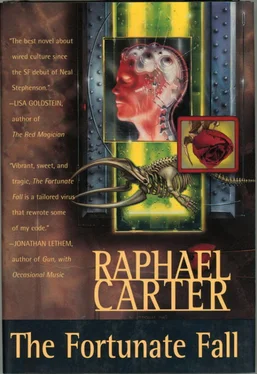Raphael Carter - The Fortunate Fall
Здесь есть возможность читать онлайн «Raphael Carter - The Fortunate Fall» весь текст электронной книги совершенно бесплатно (целиком полную версию без сокращений). В некоторых случаях можно слушать аудио, скачать через торрент в формате fb2 и присутствует краткое содержание. Город: New York, Год выпуска: 1996, ISBN: 1996, Издательство: Tor Books, Жанр: Киберпанк, на английском языке. Описание произведения, (предисловие) а так же отзывы посетителей доступны на портале библиотеки ЛибКат.
- Название:The Fortunate Fall
- Автор:
- Издательство:Tor Books
- Жанр:
- Год:1996
- Город:New York
- ISBN:0-312-86034-X
- Рейтинг книги:3 / 5. Голосов: 1
-
Избранное:Добавить в избранное
- Отзывы:
-
Ваша оценка:
- 60
- 1
- 2
- 3
- 4
- 5
The Fortunate Fall: краткое содержание, описание и аннотация
Предлагаем к чтению аннотацию, описание, краткое содержание или предисловие (зависит от того, что написал сам автор книги «The Fortunate Fall»). Если вы не нашли необходимую информацию о книге — напишите в комментариях, мы постараемся отыскать её.
“Gripping…. One of the most promising SF debuts in recent years”.
—“Publisher’s Weekly” starred review
The Fortunate Fall — читать онлайн бесплатно полную книгу (весь текст) целиком
Ниже представлен текст книги, разбитый по страницам. Система сохранения места последней прочитанной страницы, позволяет с удобством читать онлайн бесплатно книгу «The Fortunate Fall», без необходимости каждый раз заново искать на чём Вы остановились. Поставьте закладку, и сможете в любой момент перейти на страницу, на которой закончили чтение.
Интервал:
Закладка:
I put on my robe, fed the bugs, and ate breakfast, scooping up leftover chickpeas with a hardened bagel. My body, unused to anything but coffee and nanojuice at this hour, soon warmed to the idea and sent me scurrying after the lentils, which I finished with a spoon. They tasted better than they had last night. They were better cold; no, I had been distracted; no, I had forgotten how to taste food years ago, and only now remembered.
When I’d finished my makeshift breakfast, I gathered the camera chips, replaced them in the rosebox, and took it into the bathroom to dress. I opened all three flaps of the box, set it on end, and watched it rotate. How do you dress for the biggest interview of your life?
Exactly like any other day, I realized, and I put the box under the sink. This interview would bring scrutiny. If I had suddenly changed moistware just before it, people might suspect something. But if I changed a few days after, it would look like I went out and spent my bonus on an upgrade, and no one would think twice. I went to the living room to retrieve my old camera chip.
The moment I slotted it in, I was glad of my decision. That chip and I had been through decades of obscurity together; it would be heartless to change now, on the cusp of my first real success. And she could love me even so; I knew that. She had known me no other way.
I put on the most ordinary outfit in my closet and went back into the kitchen. As I poured coffee into a selfheating News One mug, a note on the refrigerator caught my eye. It hadn’t been there at breakfast. I put down the coffeepot and went to look. There was no salutation, no signature, only two words in a large flowing cursive: BE BOLD. I stood there looking at the note a long time, feeling the warmth of the mug as I rested it against my collarbone. Then I reached out to touch the note, and passed my hand through it: unreal.
The phone chimed, and I answered it without begrudging the intrusion.
“Good morning,” Keishi said.
I had to choke back my usual rejoinder—“That’s an oxymoron.” Instead I said, “Yes, I think it is.”
She smiled appraisingly. “You know, this has really changed you. You look five years younger than you did last night.”
I sniffed the air. “Are you testing my sense of smell again?”
She laughed politely. “I take it you’re not having second thoughts about last night.”
“When I do, you’ll know.”
“Then, ah, may I ask why you’re not wearing the murder weapon?”
“Gold and dead gods aren’t my style, I guess. Why do they do that, anyway? You see Egyptian gods plastered over everything that’s African, but nobody worships them.”
“That’s why they do it. They figure that since those gods are dead, they won’t get pissed off about how you use their images.”
“Oh, I see. Same reason people throw around the Coca-Cola logo.”
Keishi smiled. “You’ve got two other sets, you know. The polychromes can look like whatever you want. Including the Coca-Cola logo.”
“I thought I’d better wait a few days,” I said, more soberly. “This would be a bad time for a mysterious upgrade. It’s better to wait till the worst of the furor has passed.”
She bit her lower lip. “The new chip will need some burning-in time, you know, if it’s going to do all its tricks. It can use the pathways your old one established if it has to, but it really ought to add more.”
“All the more reason not to try using it today.”
She looked away from the screen, then back at me. “Maya, can I ask you to just slot one of the 6000s? I can’t tell you why until— until later today. But I wouldn’t ask unless there were a good reason.”
“Look,” I said firmly, “I’m as disappointed as you are. But you promised me ten years, and I mean to collect every minute. It’d be foolish to throw it all away because I couldn’t wait for a couple of days.”
“Then take them with you,” she insisted. “What if your old chip fails? One whiff of seawater and it could rust up like—”
“Keishi,” I said. “You’re being ridiculous.”
She lowered her eyes, but not before I saw her face cloud. Well, love was impatient. Or so I told myself, not really knowing whether it was or not. “I suppose you’re right,” she said forlornly. Then she suddenly brightened. “Say, why don’t you come to Arkhangelsk early? There’s a train at 9:15.”
“I guess I could. There’s not much left for me to do here. Any special reason?”
“Apart from the obvious? I’m trying to sniff out that whale. If I do, maybe we can crash Voskresenye’s party a little early and get this story put together right.”
I shook my head in amazement. “How did I ever get along without you? Here I’ve practically forgotten the whole story, and you’re working harder than ever.”
She inclined her head, obviously pleased.
“Where should I meet you, then?”
She hesitated for what was, to a megascops, quite a long time. At last she said: “When you get to the trainport I’ll be there.”
“You mean in person?”
“… Yes.”
“Well, it will be nice to meet you, Keishi Mirabara.”
“You know,” she said carefully, “I don’t look exactly like my Net image.”
“Who does?” I said, laughing. Then I saw how nervous she was, so I said, “I still don’t know exactly how I feel about you, but I doubt it would make any difference if you weighed a hundred kilograms.”
She looked up sharply, then relaxed and smiled. “I may just hold you to that.”
“Well, I’ll find out in Arkhangelsk.”
Her face grew wistful again. “Yes, you will…. Maya, I love you.” She smiled, rather weakly, and held up a hand. “No, don’t answer. I know you can’t yet.” Her image vanished.
I whispered to the blank monitor: “I hope I love you too.”
I stood there thinking until the phone reverted to its clock display, then jumped: it was almost 8:30. Barely time to put on my coat, shrink-seal my sockets, wrap a plastic babushka around my head, and run to the trainport. I plunged out into the rain, feeling, reckless and rakish. A dangerous joy was gathering in my heart: the kind of joy that makes you do things you remember all your life, not necessarily with fondness. I stepped right into the braided ripples in the gutter, and crossed the street in defiance of all laws of traffic.
The quickest route was through the park. I started to walk around to the gate. But on my way, I noticed a gap in the hedge that children squeeze through when, to their childish impatience, the gate seems too far. On impulse I ducked into it, emerging on the other side with leaves and twigs clinging to my coat. Well, let them cling. I would not bother to brush them away.
The rain pounded against my head, and the sky was a charred log. It was almost perfect; but it needed music. I switched on Audio Classical Seven—picking the number for luck. White letters, projected onto the saturated grass, informed me that I was hearing Mozart’s Requiem. Then the lyrics began to scroll through my peripheral vision. A sing-along? Well, all right, I’m no soprano but I can follow the bouncing ball. I sang loudly and tunelessly, the Net helping me to understand the Latin. Dies irae, dies illa, solvet saeclum in favilla: a day of wrath, that day, it will blow the world to smithereens—or words to that effect. But not just yet, please; I have ten years coming; do it then.
Then I thought of Keishi’s passphrase, and gave it to the Net to translate. “All you people who pass on the street…” Yes. Yes, that was just how I felt.
As I racewalked my way through the park, I came upon two women ducking under a single umbrella. Their heads were almost touching, and at my approach they looked up with, it seemed to me, guilt: caught in the act, by a camera, no less.
Читать дальшеИнтервал:
Закладка:
Похожие книги на «The Fortunate Fall»
Представляем Вашему вниманию похожие книги на «The Fortunate Fall» списком для выбора. Мы отобрали схожую по названию и смыслу литературу в надежде предоставить читателям больше вариантов отыскать новые, интересные, ещё непрочитанные произведения.
Обсуждение, отзывы о книге «The Fortunate Fall» и просто собственные мнения читателей. Оставьте ваши комментарии, напишите, что Вы думаете о произведении, его смысле или главных героях. Укажите что конкретно понравилось, а что нет, и почему Вы так считаете.












